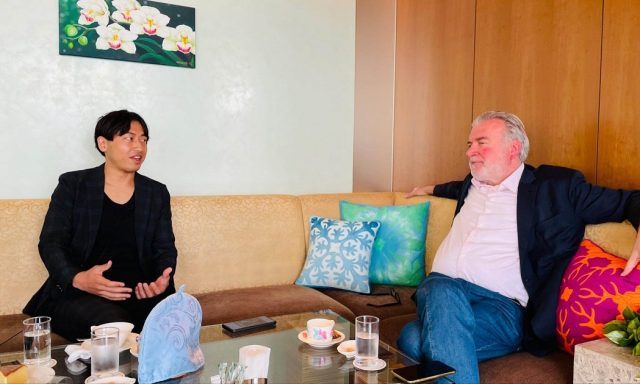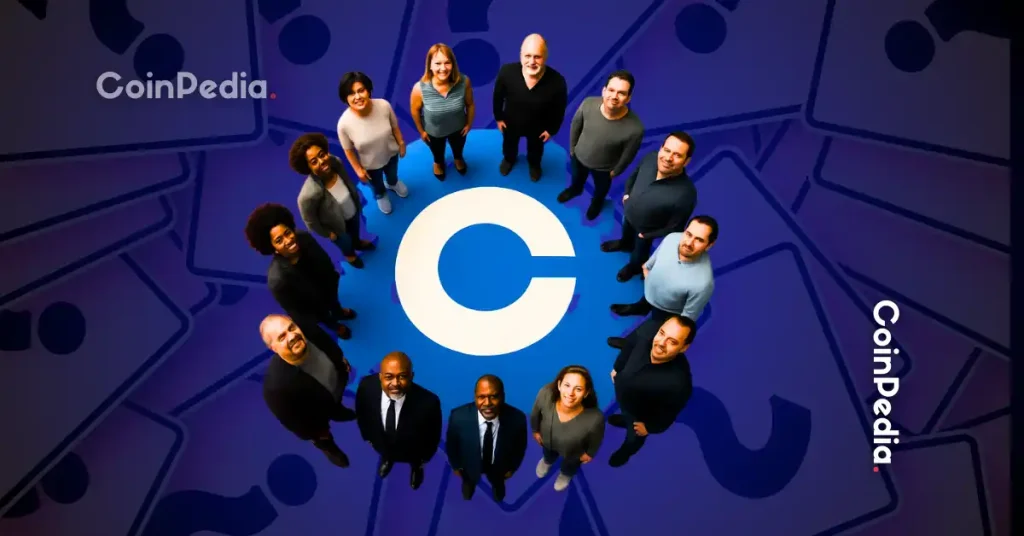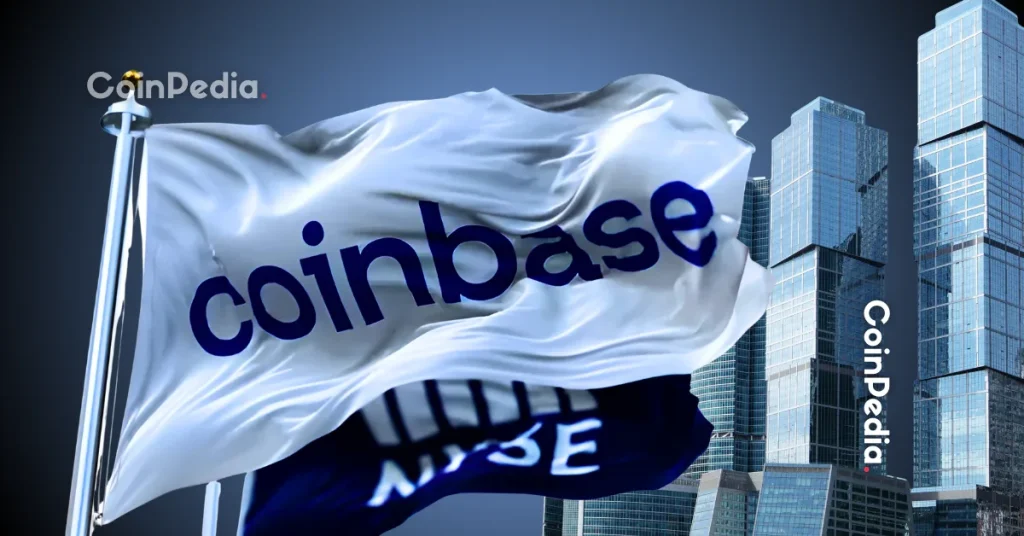
Concordium Chairman Mr. Christensen and Mr. Shogo Ochiai
In May 2023, he is the founder of “Concordium” blockchain, which provides a blockchain that enables regulatory compliance, and is located in Zug, Switzerland, which is called “Crypto Valley”, a cluster of crypto-asset (virtual currency)-related companies. Mr. Lars Seier Christensen, chairman of the Concordium Foundation, which is based in Japan, came to Japan. A dialogue with blockchain engineer Shogo Ochiai was realized.
The conversation focused on the vision of how Concordium would integrate traditional finance and blockchain technology through its digital identity management capabilities.
According to Christensen, there are many inefficiencies in the traditional financial sector and significant room for improvement. On the other hand, decentralized finance (DeFi) has always had concerns about anonymity, money laundering and terrorist financing.
Concordium is addressing these issues by introducing an ID layer on the blockchain platform. Christensen argues that the identity layer solves many of the problems of the normal financial system by allowing users to prove and manage their identities. In addition, he said that such an identity management system would be essential for DeFi (decentralized finance) projects, which are under increasing pressure from regulators.

Christensen co-founded Saxo Bank, an online bank in Denmark, and has been CEO for 20 years. In 2018, he launched the Concordium project and established the Concordium Blockchain Research Center (COBRA) at Aarhus University, Denmark. He works with a team of experts to develop the protocol.
His interview partner, Shogo Ochiai, runs Solidity House, a boot camp facility in Saga Prefecture that trains engineers with solidity language and high literacy. As a blockchain developer and researcher, he is working to realize a public DAO (Decentralized Autonomous Organization). He has deep knowledge of smart contracts and laws and regulations, and is leading the Japanese blockchain developer community in efforts to commercialize public chains.
Through this dialogue, how will Concordium’s ID management function differentiate it from other layer 1 blockchains such as Ethereum? And we were able to get an expert’s view on how it addresses the needs of the enterprise for regulatory compliance.
About Concordium
Concordium is a permissionless layer 1 blockchain. Developers and companies can use smart contracts on this system to build various distributed applications (Dapps).
Concordium’s aim is to fuse the traditional financial industry with new technology to create a new form of finance that harmonizes the potential of blockchain with legal compliance requirements.
It is designed to balance privacy and accountability with an identity layer and zero-knowledge proofs. An identity layer ensures that Concordium is only used by those users who are willing to provide identity verification.
This makes it possible to identify users and trace the provenance of all transactions. Concordium can meet the needs of global regulators.
For example, Dapps can send users questions about attributes such as age and region of residence via the Web3 ID wallet. Users can prove their identities based on zero-knowledge proofs while limiting the information they disclose to the extent necessary.

“Our goal is to give users control over their own identities,” Christensen said.
This approach allows users to prove themselves trustworthy to others. This principle is at the heart of Concordium’s philosophy, and Christensen believes it will be an important factor in future projects.
“If it is a financial service and it involves the trading of financial assets, regulators will inevitably intervene,” Christensen said. and whether we can actually put into practice what we have agreed to in terms of establishing defenses against money laundering and terrorist financing.”
Smart contracts with legal deterrence
In addition, Christensen reveals concerns about how companies manage personal information. He pointed out that the current situation of handing over identities to major technology platforms is fraught with problems of monetization and protection of identities.
The introduction of self-sovereign identity combined with zero-knowledge proofs provided by Concordium will allow users to prove their own information limited to the extent necessary.
What is a zero-knowledge proof?
Zero-knowledge proof is a type of proof protocol, in which the prover proves that the claim is “truth” without disclosing any information other than “the claim is true” to the verifier. mechanism to do.
 Cryptocurrency Glossary
Cryptocurrency Glossary
For example, when verifying that they are over 18, users can verify their age without revealing their address or social security number. In this way, the risk of getting into unnecessary trouble is eliminated, Christensen explained.

On the other hand, Mr. Ochiai evaluated the Concordium as a very unique infrastructure. He pointed out that the smart contract layer could be used to combine entities with legal power (corporations), such as companies and government agencies, with systems without a central administrator (trustless systems).
By incorporating trustless smart contract parts such as “law deterrence by ID revoking,” it is said that it will be possible to execute applications that have both market principles and law enforcement.
In fact, Concordium also has a law enforcement function, with a mechanism whereby accounts that behave inappropriately will be deprived of their privacy through legal action and their owners identified.
A feature called “anonymous (privacy) revoker” is an identity disclosure mechanism that can be invoked by regulators. However, a court order is required for regulators to require disclosure of user IDs.
With these features, nodes that attempt to deceive users will have their identities disclosed and may face legal penalties as well as market-based penalties. Ochiai credits these deterrents as unique features that set Concordium’s smart contracts apart from other platforms.
While regular Ethereum smart contracts only have market incentives, Concordium has market and law enforcement. A feature of Concordium smart contracts is that in the crypto economy, besides market principles, there are things like law enforcement and law principles.
Concordium use case
Looking at specific enterprise use cases, Christensen said that many companies are currently showing interest in Concordium in the fields of automotive and ESG carbon credits.
Among them, Lars highlighted the Danish power grid as a particularly interesting use case. The country controls electricity throughout the country through Transmission System Operators (TSOs) and sells electricity by the hour. And in seeking a way to keep track of which source of power it’s coming from, it’s using the Concordium.
When the Danish power grid is fully implemented, it will be about 31 billion yen, with about 800 registrations per year, and a huge amount of data. This use case is exclusive to Denmark, but in Japan, where the scale is larger, it could be 20 times that.
The Danish grid company aims to sell the solution to other European grid operators, with three or four countries already committed to adopting the system. Several countries are bigger than Denmark, he added.
Potential for Rust engineering
Having previously served as CEO of Saxo Bank, Christensen is keenly aware that in order for blockchain to become part of critical infrastructure, it must be a robust and secure platform.
His experience and insights are directly reflected in Concordium’s projects. Specifically, the blockchain system adopts a structure with a special layer to ensure safety called the “finality layer” above the consensus layer. This secure structure establishes a mechanism by which even if the system is compromised, its impact will be limited to the most recent blocks, while preserving previous blocks.

In addition, we have chosen a programming language called Rust to pursue the realization of high security. Rust is a language that can directly access and manipulate computer hardware and processors, and is highly evaluated for its high performance and safety. Rust has properties that minimize bugs and unexpected errors, and as a result, it is widely adopted by major IT companies such as Microsoft, Google, and Amazon.
Against this background, Mr. Ochiai highly appreciates the fact that Concordium can use Rust not only for smart contract development but also as a protocol development language. This fact shows that it is possible to be directly involved in the underlying technology of the blockchain, and Concordial will exert a greater influence on the blockchain system, such as adding new functions and improving existing functions. It is said that there is a possibility.
For Rust engineers, the Concordium core team is a very attractive option, and as a smart contract developer, you can choose the protocol layer later, which is a very good choice. I think there is a great abundance of chances and opportunities. I would like to encourage Japanese engineers to try the Concordium.
The Concordium website lists the positions it is currently hiring. Christensen also said the company is committed to helping developers through the launch of new grant programs and developer education programs.
As part of this effort, he is providing the funding needed to rewrite smart contracts for developers wishing to migrate to Concordium from other blockchains. He also provides technical assistance to those with innovative ideas.

In addition, it has a wide range of initiatives, including a self-learning academy, technical support by phone, and job opportunities for developers, he said.
At the end of the conversation, Christensen revealed that he plans to hold a hackathon in Japan in the summer of 2023. In response, Mr. Ochiai said:
I’m sure there are many developers who have little experience with Rust, but are interested in smart contracts. So am I. I don’t have much experience developing smart contracts in Rust, but if you’re a developer who brings a new perspective to the space, you’ll appreciate the new principles in Concordium’s smart contracts and the innovation of the legally enforceable anonymity revoker system. I think you will notice.
Ochiai also expressed his desire to hold a hackathon focused on creating new types of DeFi protocols and social dApps at his Solidity House in Saga prefecture.
The post Special talk with Concordium founder Mr. Ochiai of Solidity House appeared first on Our Bitcoin News.

 2 years ago
85
2 years ago
85














 English (US) ·
English (US) ·